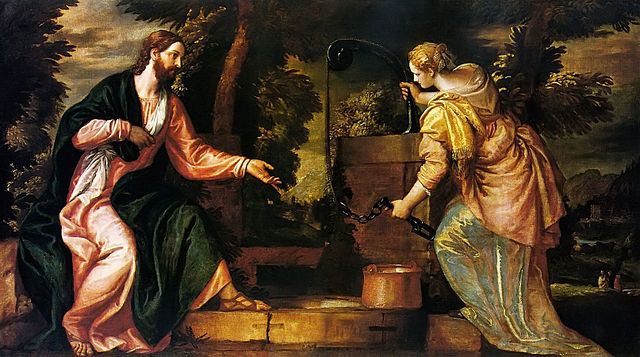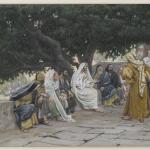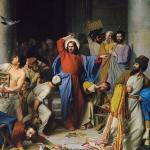
This is an installment of my series of replies to an article by Dr. David Madison: a pastor in the Methodist Church for nine years, who has a PhD in Biblical Studies from Boston University. It’s called, “Things We Wish Jesus Hadn’t Said” (Debunking Christianity, 7-21-19). His words will be in blue below. Dr. Madison makes several “generic” digs at Jesus and Christianity, in the written portion (it details a series of 12 podcasts):
A challenge for Christians: If you’re so sure Jesus existed, then you have some explaining to do. A major frustration is that, while believers are indignant at all the talk about Jesus not existing, they don’t know the issues that fuel the skepticism—and are unwilling to inform themselves.
Yes, I’m up to the “challenge.” No problem at all. I’m not threatened or “scared” by this in the slightest. It’s what I do, as an apologist. The question is whether Dr. Madison is up to interacting with counter-critiques? Or will he act like the voluminous anti-theist atheist polemicist Bob Seidensticker?: who directly challenged me in one of his own comboxes to respond to his innumerable attack-pieces against Christianity and the Bible, and then courageously proceeded to utterly ignore my 35 specific critiques of his claims as of this writing. We shall soon see which course Dr. Madison will decide to take. Anyway, he also states in his post and combox:
[S]o many of the words of Jesus are genuinely shocking. These words aren’t proclaimed much from the pulpit, . . . Hence the folks in the pews have absorbed and adored an idealized Jesus. Christian apologists make their livings refiguring so many of the things Jesus supposedly said.
The gospels are riddled with contradictions and bad theology, and Jesus is so frequently depicted as a cult fanatic—because cult fanatics wrote the gospels. We see Jesus only through their theological filters. I just want to grab hold of Christian heads (standing behind them, with a hand on each ear) and force them to look straight ahead, unflinchingly, at the gospels, and then ask “Tell me what you see!” uncoached by apologist specialists, i.e., priests and pastors, who’ve had a lot of practice making bad texts look good. . . . I DO say, “Deal with the really bad stuff in the gospels.” Are you SURE you’ve not make a big mistake endorsing this particular Lord and Savior? That’s the whole point of this series of Flash Podcasts, because a helluva lot of Christians would agree, right away, that these quotes are bad news—if no one told then that they’ve been attributed to Jesus.
Of course, Dr. Madison — good anti-theist atheist that he is — takes the view that we are not at all sure whether Jesus in fact said anything recorded in the Gospels in the first place. I don’t play that game, because there is no end to it. It’s like trying to pin jello to the wall. The atheist always has their convenient out (when refuted in argument about some biblical text) that Jesus never said it anyway [wink wink and sly patronizing grin], and/or that the biblical text in question was simply added later by dishonest ultra-biased Christian partisans and propagandists. It’s a silly and ultimately intellectually dishonest game, and so I always refuse to play it with atheists or anyone else, because there is no way to “win” with such an absurdly stacked, purely subjective deck.
In my defense of biblical texts, I start with the assumption that the manuscripts we have are quite sufficient for us to know what is in the Bible (believe it or not). Going on from there, I simply defend particular [supposedly “difficult”] texts, and note with appropriate argumentation, that “here, the Bible teaches so-and-so,” etc. I deal with the texts as they exist. I don’t get into the endlessly arbitrary, subjective games that atheists and theologically liberal biblical skeptics play with the texts, in their self-serving textual criticism.
Dr. Madison himself (fortunately) grants my outlook in terms of practical “x vs. y” debate purposes: “For the sake of argument, I’m willing to say, okay, Jesus was real and, yes, we have gospels that tell the story.” And in the combox: “So, we can go along with their insistence that he did exist. We’ll play on their field, i.e., the gospels.”
Good! So we shall examine his cherry-picked texts and see whether his interpretations of them can stand up to scrutiny. He is issuing challenges, and I as an apologist will be dishing a bunch of my own right back to him. Two can play this game. I will be dealing honestly with his challenges. Will he return the favor, and engage in serious and substantive dialogue? Again, we’ll soon know what his reaction will be. A true dialogue is of a confident, inquisitive, “nothing to fear and everything to gain” back-and-forth and interactive nature, not merely “ships passing in the night” or what I call “mutual monologue.”
*****
Dr. Madison’s eighth podcast of twelve is entitled: “On John 6:53-57, eating the flesh of Jesus and drinking his blood are the key to eternal life”. Here is the passage:
John 6:53-57 So Jesus said to them, “Truly, truly, I say to you, unless you eat the flesh of the Son of man and drink his blood, you have no life in you; [54] he who eats my flesh and drinks my blood has eternal life, and I will raise him up at the last day. [55] For my flesh is food indeed, and my blood is drink indeed. [56] He who eats my flesh and drinks my blood abides in me, and I in him. [57] As the living Father sent me, and I live because of the Father, so he who eats me will live because of me.
It’s hard to come up with a better example of magical thinking. How in the world could eating flesh and blood, even if it belonged to a God, bestow eternal life? . . . These verses in John’s Gospel are grotesque magic . . . eating a God to live forever is not real world thinking. It’s magical thinking. It’s bad religion; it’s bad theology. . . . What an embarrassment that this text ended up in the New Testament.
Dr. Madison makes two major points about this text. First he argues that it echoes elements in other mystery religions before or during the time of Jesus; therefore, it is immediately suspect, and was simply yet another deceitful technique used by cult propagandists Mark, Luke, and now John (or whoever he thinks put the Gospel that bears his name together), to put onto the lips of Jesus. He sees this as a disproof of the claim that Jesus even said what He did in John 6.
But it’s by no means certain that when an idea has some aspects within it that were previously present elsewhere, that in and of itself, it disproves the later idea. Why would anyone think that? Yet this is common playbook / talking-points of both atheists and dissident theological liberals, when approaching historic Christianity and the Bible. Let me provide three analogies or word-pictures to reveal the blatant fallacy involved here:
1) Modern astronomy and the theory of gravity both contain ideas which were present in the prior field of astrology; namely: distant bodies have an influence on the earth. Does it follow that, therefore, gravitation is untrue, simply because of this fact? No, of course not. Astrology had hit upon some truths, while also espousing many falsehoods. And in fact, Isaac Newton was neck-deep in the antiquated pseudo-science of alchemy and other occultic beliefs, at the same time he did legitimate, ground-breaking science; and early astronomers like Galileo, Copernicus, and Kepler, were equally enthralled with astrology, even while they made their momentous contributions to modern astronomy and physics. By the way, St. Thomas Aquinas 300-400 years earlier, and St. Augustine 1100-1200 years earlier, both rejected astrology. Historical truth is much more interesting than revisionist historical fiction.
2) It’s often noted that there is a Deluge account in the Epic of Gilgamesh; therefore, this casts doubt on the story of Noah’s Flood. But why would it? Is it not more plausible to assert that if in fact (for the sake of argument) such a major Flood had occurred, that other cultures besides Hebrew culture would more likely know about it, rather than not? Say for the sake of argument that the Bible had mentioned Halley’s Comet. We now know that it passes by the earth every 76 years. No doubt many cultures have some written record of observing it. But if the Bible had happened to mention it, it would immediately be suspect because non-Hebrews also wrote about it? Clearly not.
3) Several cultures for centuries used mold in order to help people heal. Later it was discovered that the antibiotic penicillin was derived from mold. Is it therefore to be rejected as a result? Nope. This is shoddy reasoning. The Wikipedia article. “History of penicillin” noted:
Many ancient cultures, including those in Egypt, Greece, and India, independently discovered the useful properties of fungi and plants in treating infection. These treatments often worked because many organisms, including many species of mold, naturally produce antibiotic substances. However, ancient practitioners could not precisely identify or isolate the active components in these organisms.
A similar argument can be made regarding aspirin. The Wikipedia article notes: “A precursor to aspirin found in leaves from the willow tree has been used for its health effects for at least 2,400 years.” My own family has taken white willow bark for many years to treat pain.
In fact, Catholic apologist G. K. Chesterton, in his masterpiece, The Everlasting Man, argued that it is precisely to be expected, and is an argument in favor of Christianity, that there are many precursors to it: especially in the paganism that flourished in the previous 500 years or so. Anglican apologist C. S. Lewis, in his book, The Abolition of Man, has a section at the end (“Illustrations of the Tao”) in which he shows (and rejoices in) many similarities of world religions.
Young Lewis (very much like myself in my teen years) was enthralled with Norse mythology and Wagner’s operas, etc., and was an atheist. He became a theist after a discussion with J. R. R. Tolkien, in which the latter noted that “Christianity was a true myth.” It had never occurred to Lewis that there could be such a thing as a myth that actually happened. I have written about supposed “pagan elements” in Catholicism: which is a charge that anti-Catholic Protestants often make. It’s fascinating to now see an atheist former Methodist minister use the same fallacious tactic:
Heartfelt Sacramentalism (Not Mere Charms) [1996]Why do Catholics Believe that Sacraments are Necessary? [2002]
Sacraments & the Moral Responsibility of Their Recipients [8-26-06]
Are Relics & Sacraments Mere Magical Charms? [2007]
Dialogue on Sacramentalism, Holy Objects, and Relics [2-26-09]
Bible on Physical Objects as Aids in Worship [4-7-09]
Sacraments: Bible & Church Fathers (vs. Calvin #34) [9-25-09]
The Biblical Understanding of Holy Places and Things [National Catholic Register, 4-11-17]
Biblical Evidence for Sacramentalism [National Catholic Register, 8-29-17]
Obviously, Dr. Madison is not likely at all to be persuaded of a full Catholic eucharistic theology (or any theology at all). He’s a hostile apostate. But I think perhaps he could be made to see at least (and many others can grasp) that it is not mere “grotesque magic.” He asks, “How in the world could eating flesh and blood, even if it belonged to a God, bestow eternal life?” Well, it can because an omnipotent God decreed it to be so, just as the Bible also teaches regeneration and salvation by means of water baptism.
John 6:31 “Our fathers ate the manna in the wilderness; as it is written, ‘He gave them bread from heaven to eat.’ ”
John 6:35 . . . “I am the bread of life; he who comes to me shall not hunger, and he who believes in me shall never thirst.”*John 6:48-51 “I am the bread of life. [49] Your fathers ate the manna in the wilderness, and they died. [50] This is the bread which comes down from heaven, that a man may eat of it and not die. [51] I am the living bread which came down from heaven; if any one eats of this bread, he will live for ever . . .”
John 6:51b-52 “. . . the bread which I shall give for the life of the world is my flesh.” [52] The Jews then disputed among themselves, saying, “How can this man give us his flesh to eat?” [followed by the text that Dr. Madison cites]
John 6:58 “This is the bread which came down from heaven, not such as the fathers ate and died; he who eats this bread will live for ever.”
Jesus makes a similar parallel with the woman at the well:
John 4:9-14 The Samaritan woman said to him, “How is it that you, a Jew, ask a drink of me, a woman of Samar’ia?” For Jews have no dealings with Samaritans. [10] Jesus answered her, “If you knew the gift of God, and who it is that is saying to you, `Give me a drink,’ you would have asked him, and he would have given you living water.” [11] The woman said to him, “Sir, you have nothing to draw with, and the well is deep; where do you get that living water? [12] Are you greater than our father Jacob, who gave us the well, and drank from it himself, and his sons, and his cattle?” [13] Jesus said to her, “Every one who drinks of this water will thirst again, [14] but whoever drinks of the water that I shall give him will never thirst; the water that I shall give him will become in him a spring of water welling up to eternal life.”
John 7:37-38 On the last day of the feast, the great day, Jesus stood up and proclaimed, “If any one thirst, let him come to me and drink. [38] He who believes in me, as the scripture has said, `Out of his heart shall flow rivers of living water.'”
Revelation 21:6 . . . To the thirsty I will give from the fountain of the water of life without payment.
This is biblical sacramentalism. It’s nothing unusual at all. It’s what the Bible teaches. Whether one rejects it, is another matter, but the Bible does unmistakably teach it. In this case, it make perfect internal sense: just as physical food gives biological nourishment, eucharistic “food” gives spiritual nourishment and grace.
Sacramentalism exists in the first place because God knew that human beings could relate a lot better to physical, concrete things that conveyed grace, rather than purely abstract grace. And He knew that they could grasp analogies, parables, and parallelism.
***
Photo credit: Jesus and the Samaritan Woman (c. 1585), by Paolo Veronese (1528-1588) and his workshop [public domain / Wikimedia Commons]
***













